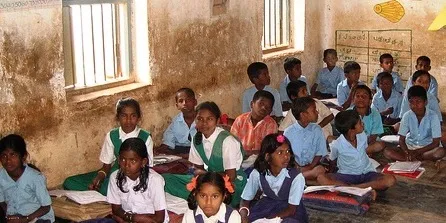

Passing the 3rd grade – not as easy as I thought
What happens when children in a public school of rural Bihar go for their exams, is startlingly different from our realities in Urban India.
Jaiti, an India Fellow from 2017-18 cohort is working at Quest Alliance in Samastipur, Bihar. She supports the team to set-up and runs community resource centers for better learning outcomes among children.

Exams!
What if I ask you to recall the scene of your classroom during an examination. I remember pin drop silence. Those 3 hours used to be the most silent hours of the entire year. I can still recall the tick-tock sound of the clock during that time. After every few minutes, the invigilator would remind us how much time was left. I used to carry 3-4 sharpened pencils so that my time doesn't get wasted in sharpening while I'm writing. We would get scolded even if we look up!
Recently, my image of such an exam hall shattered when I started working with government schools in Samastipur, Bihar. As a part of my project, my mentor and I visit these schools to conduct workshops with school teachers. The other day we reached a little earlier. The exams were going on.
I spoke to the headmaster and found out that only primary school students had their exams. I walked towards the 3rd grade classroom and began to hear the sound of students. A teacher walked out of the class. Inside, the kids were sitting in a group on the floor. A few students had one answer sheet which had all the answers written. Those who did not know how to read and write were being helped by senior students. The teacher had come back, annoyed.

I was surprised and filled with questions like ”What's going on here?” and ”Is this an exam hall?”.
Ultimately, I could not stop myself from asking the teacher, "Aaj exam tha na? Ye kya ho raha hai?". She replied, “Yes, but what does one do". She continued,
"Most of the students don't know how to read and write. Plus, the question paper is tough for them. They cannot read English words properly. How will they read whole sentences and then write answers. Question paper should be easier for students to understand. Plus, these children don’t have books to study, and because of no-detention policy, we are bound to pass each one of them.”
With this I came to terms with reality of an examination, so different from my own. It wasn’t for me to announce a verdict of how fair or unfair this was, given the situation. But, that's our truth away from the comfort of our homes, where education is only about passing tough exams. We set the rules of delivering content without thinking about its consequences.
Will these children ever learning anything from education and be ready to be employed for the jobs they wish to do? The question is for all of us to answer!




